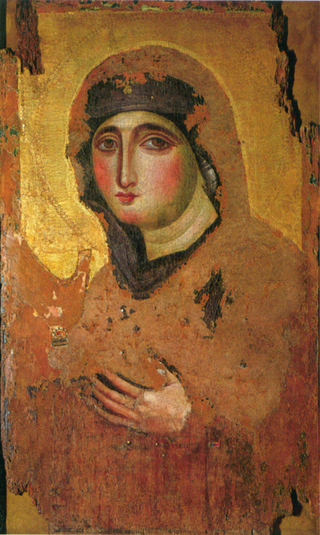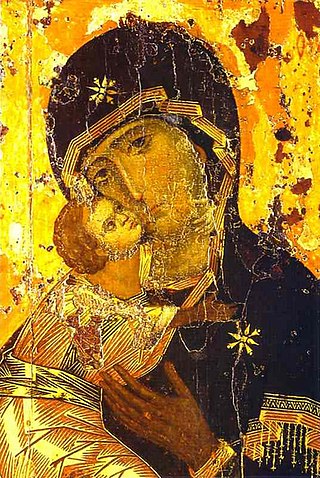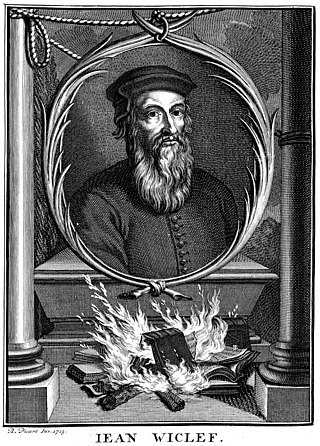
Mary was a first-century Jewish woman of Nazareth, the wife of Joseph and the mother of Jesus. She is a central figure of Christianity, venerated under various titles such as virgin or queen, many of them mentioned in the Litany of Loreto. The Eastern and Oriental Orthodox, Church of the East, Catholic, Anglican, and Lutheran churches believe that Mary, as mother of Jesus, is the Mother of God. Other Protestant views on Mary vary, with some holding her to have considerably lesser status.

Johannes Oecolampadius was a German Protestant reformer in the Calvinist tradition from the Electoral Palatinate. He was the leader of the Protestant faction in the Baden Disputation of 1526, and he was one of the founders of Protestant theology, engaging in disputes with Erasmus, Huldrych Zwingli, Martin Luther and Martin Bucer. Calvin adopted his view on the Eucharist dispute.
The five solae of the Protestant Reformation are a foundational set of Christian theological principles held by theologians and clergy to be central to the doctrines of justification and salvation as taught by the Calvinism and Lutheranism branches of Protestantism, as well as in some sects of Pentecostalism. Each sola represents a key belief in these Protestant traditions that is distinct from the theological doctrine of the Catholic Church, although they were not assembled as a theological unit until the 20th century. The Reformers are known to have only clearly stated two of the five solae. Even today there are differences as to what constitutes the solae, how many there are, and how to interpret them to reflect the Reformers' beliefs.

The perpetual virginity of Mary is a Christian doctrine that Mary, the mother of Jesus, was a virgin "before, during and after" the birth of Christ. In Western Christianity, the Catholic Church adheres to the doctrine, as do some Lutherans, Anglicans, Reformed, and other Protestants. Shenouda III, Pope of the Coptic Orthodox Church, affirmed the teaching, and Eastern Orthodox churches recognize Mary as Aeiparthenos, meaning "ever-virgin". It is one of the four Marian dogmas of the Catholic Church. Most modern nonconformist Protestants reject the doctrine.

Jaroslav Jan Pelikan Jr. was an American scholar of the history of Christianity, Christian theology, and medieval intellectual history at Yale University.

Peter Canisius was a Dutch Jesuit priest. He became known for his strong support for the Catholic faith during the Protestant Reformation in Germany, Austria, Bohemia, Moravia, Switzerland and the British Isles. The restoration of the Catholic Church in Germany after the Protestant Reformation is largely attributed to the work there of the Society of Jesus, which he led. He is venerated in the Catholic Church as a saint and as a Doctor of the Church.

Catholic Mariology is Mariology in Catholic theology. According to the Immaculate Conception taught by the Catholic Church, she was conceived and born without sin, hence Mary is seen as having a singular dignity above the saints, receiving a higher level of veneration than all angelic spirits and blessed souls in heaven. Catholic Mariology thus studies not only her life but also the veneration of her in daily life, prayer, hymns, art, music, and architecture in modern and ancient Christianity throughout the ages.

Marian devotions are external pious practices directed to the person of Mary, mother of God, by members of certain Christian traditions. They are performed in Catholicism, High Church Lutheranism, Anglo-Catholicism, Eastern Orthodoxy and Oriental Orthodoxy, but generally rejected in other Christian denominations.

The term Evangelical Catholic is used in Lutheranism, alongside the term Augsburg Catholic, with those calling themselves Evangelical Catholic Lutherans or Lutherans of Evangelical Catholic churchmanship stressing the catholicity of historic Lutheranism in liturgy, beliefs, practices, and doctrines. Evangelical Catholics teach that Lutheranism at its core "is deeply and fundamentally catholic". The majority of Evangelical Catholic Lutheran clergy and parishes are members of mainstream Lutheran denominations.
Anglican Marian theology is the summation of the doctrines and beliefs of Anglicanism concerning Mary, mother of Jesus. As Anglicans believe that Jesus was both human and God the Son, the second Person of the Trinity, within the Anglican Communion and Continuing Anglican movement, Mary is accorded honour as the theotokos, a Koiné Greek term that means "God-bearer" or "one who gives birth to God".

Mariology is the theological study of Mary, the mother of Jesus. Mariology seeks to relate doctrine or dogma about Mary to other doctrines of the faith, such as those concerning Jesus and notions about redemption, intercession and grace. Christian Mariology aims to place the role of the historic Mary in the context of scripture, tradition and the teachings of the Church on Mary. In terms of social history, Mariology may be broadly defined as the study of devotion to and thinking about Mary throughout the history of Christianity.

Protestant views on Mary include the theological positions of major Protestant representatives such as Martin Luther and John Calvin as well as some modern representatives. While it is difficult to generalize about the place of Mary, mother of Jesus in Protestantism given the great diversity of Protestant beliefs, some summary statements are attempted.
Karl Barth's views on Mary agreed with much Roman Catholic dogma but disagreed with the Catholic veneration of Mary. Barth, a leading 20th-century theologian, was a Reformed Protestant. Aware of the common dogmatic tradition of the early Church, Barth fully accepted the dogma of Mary as the Mother of God. Through Mary, Jesus belongs to the human race. Through Jesus, Mary is Mother of God.

The history of Catholic Mariology traces theological developments and views regarding Mary from the early Church to the 21st century. Mariology is a mainly Catholic ecclesiological study within theology, which centers on the relation of Mary, the Mother of God, and the Church. Theologically, it not only deals with her life but with her veneration in life and prayer, in art, music, and architecture, from ancient Christianity to modern times.

Throughout history, Catholic Mariology has been influenced by a number of saints who have attested to the central role of Mary in God's plan of salvation. The analysis of Early Church Fathers continues to be reflected in modern encyclicals. Irenaeus vigorously defended the title of "Theotokos" or Mother of God. The views of Anthony of Padua, Robert Bellarmine and others supported the doctrine of the Immaculate Conception of the Virgin Mary, which was declared a dogma in 1850.

John Calvin (1509–1564) was a French Protestant theologian during the Protestant Reformation, and one of the most influential reformers. He was a central figure for the Reformed churches, whose theological system is sometimes called Calvinism.
Lutheran Mariology or Lutheran Marian theology is derived from Martin Luther's views of Mary, the mother of Jesus and these positions have influenced those taught by the Lutheran Churches. Lutheran Mariology developed out of the deep Christian Marian devotion on which Luther was reared, and it was subsequently clarified as part of his mature Christocentric theology and piety. Lutherans hold Mary in high esteem, universally teaching the dogmas of the Theotokos and the Virgin Birth. Luther dogmatically asserted what he considered firmly established biblical doctrines such as the divine motherhood of Mary while adhering to pious opinions of the Immaculate Conception and the perpetual virginity of Mary, along with the caveat that all doctrine and piety should exalt and not diminish the person and work of Jesus Christ. By the end of Luther's theological development, his emphasis was always placed on Mary as merely a receiver of God's love and favour. His opposition to regarding Mary as a mediatrix of intercession or redemption was part of his greater and more extensive opposition to the belief that the merits of the saints could be added to those of Jesus Christ to save humanity. Lutheran denominations may differ in their teaching with respect to various Marian doctrines and have contributed to producing ecumenical meetings and documents on Mary.

Ecumenical meetings and documents on Mary, involving ecumenical commissions and working groups, have reviewed the status of Mariology in the Eastern Orthodox, Lutheran, Anglican, and Roman Catholic Churches.
Laurent Drelincourt (1626–1681) was son of the French Reformed Church theologian Charles Drelincourt (1595–1669), who was a French Protestant divine. Laurent also was a theologian, who later became a pastor, and was the author of Sonnets chrétiens sur divers sujets (1677).

Proto-Protestantism, also called pre-Protestantism, refers to individuals and movements that propagated ideas similar to Protestantism before 1517, which historians usually regard as the starting year for the Reformation era. The relationship between medieval sects and Protestantism is an issue that has been debated by historians.














